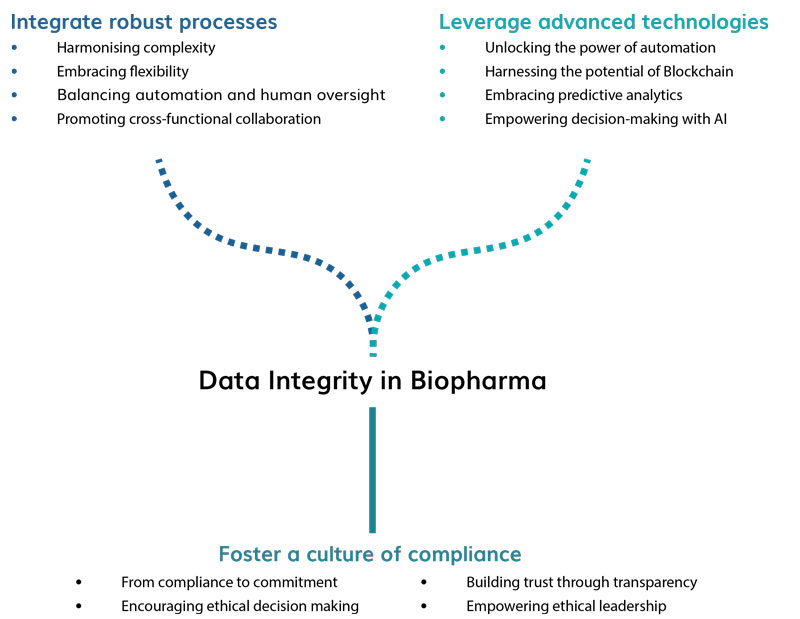A holistic approach to safeguard data integrity in Biopharma manufacturing
Posted: 29 July 2024 | Fausto Artico (argenx) | No comments yet
Data integrity is critical in Biopharma manufacturing yet is often difficult to achieve due to complex regulatory requirements and legacy data management systems, among the many factors. Furthermore, issues such as data accuracy, completeness and security impact product quality, regulatory compliance and ultimately patient safety. Addressing all these challenges demands a multifaceted approach that requires integrating robust processes, leveraging advanced technologies and creating a culture of compliance, explains Fausto Artico.


Integrating robust processes
Robust processes are the backbone of any successful operation. They serve as the foundation upon which data integrity is built. In Biopharma, where precision and accuracy are important, integrating robust processes is not just a necessity but a strategic imperative. However, the path to achieve such integration is often filled with unexpected challenges and requires the discovery and understanding of counterintuitive insights.
Harmonising complexity
It may seem logical to adopt intricate processes to capture every conceivable data point, but complexity can breed confusion and increase the risk of errors. It is therefore preferable to focus on simplifying processes, consolidating data streams and minimising unnecessary layers of bureaucracy. By streamlining operations and eliminating redundancies you enhance data integrity without sacrificing efficiency.
Embracing flexibility
Rigid protocols and procedures provide a sense of stability, but they can also stifle innovation and hinder adaptation to changing circumstances. By incorporating flexibility into process design, you can empower employees to make informed decisions in real time, respond swiftly to unexpected challenges and optimise workflows for maximum efficiency. This dynamic approach enhances data integrity and fosters a culture of agility and innovation within your organisation.
Balancing automation and human oversight
A key challenge in integrating robust processes is striking the right balance between automation and human oversight. Overreliance on automation can lead to complacency and blind trust in technology, leading to potential oversight of critical errors or deviations. Therefore, while automation can significantly reduce the risk of human error and improve efficiency, it must be complemented by human judgment and intervention. Businesses should look to design processes that leverage automation to augment human capabilities rather than replace them entirely. Doing so ensures that employees remain actively engaged in the process, exercise judgment and continue to use critical thinking to safeguard data integrity at every step.
Promoting cross-functional collaboration
An often-overlooked aspect of integrating robust processes is the importance of promoting cross-functional collaborations. Especially in complex ecosystems like the Biopharma ones, data integrity requires the collaboration of multiple departments. By breaking down silos and fostering communication and collaboration, you ensure that data integrity is upheld holistically, with each stakeholder playing a vital role in the process.
Leveraging advanced technologies
Advanced technologies are not just tools but catalysts for innovation and transformation. From automation and Artificial Intelligence (AI) to Blockchain and advanced analytics, these technologies offer unprecedented opportunities to enhance data integrity throughout the manufacturing lifecycle. However, unlocking their full potential requires a nuanced understanding of their capabilities and how they can be leveraged to overcome common challenges in unexpected ways.


Figure 1: A multifaceted approach is needed to achieve data integrity in Biopharma
Unlocking the power of automation
Automation is often heralded as a panacea for improving efficiency and reducing errors. By automating repetitive tasks and data entry processes, companies can free up valuable human resources to focus on higher-level tasks that require creativity, critical thinking and problem-solving skills. This symbiotic relationship between humans and machines enhances data integrity and empowers people to generate value in ways that machines cannot.
Harnessing the potential of Blockchain
Blockchain technology has captured the imagination of industries worldwide with its promise of immutable, decentralised ledgers. It offers a novel solution to the challenge of data integrity by providing a tamper-proof record of transactions from raw material sourcing to final product distribution. However, the benefits of Blockchain extend beyond data integrity and include supply chain transparency as well as trust-building among stakeholders. By leveraging Blockchain technology, companies ensure the integrity and traceability of their data, and reduce the number and type of counterfeit products.
Embracing predictive analytics
While traditional analytics focuses on analysing historical data to identify patterns and trends, predictive analytics takes it a step further by forecasting future outcomes and trends. Therefore, predictive analytics offers valuable insights that can help companies to proactively mitigate risks before they escalate. With predictive analytics, analysing historical data patterns, identifying potential risk factors and predicting future trends, you can optimise manufacturing processes, anticipate potential deviations and implement preventative measures to safeguard data integrity. This proactive approach enhances regulatory compliance, improves operational efficiency and reduces costs.
While automation can significantly reduce the risk of human error and improve efficiency, it must be complemented by human judgment and intervention
Empowering decision-making with AI
AI is revolutionising Biopharma manufacturing by enabling algorithms to learn from data, identify patterns and make informed decisions even without human intervention. By leveraging AI-powered algorithms to analyse complex datasets, identify anomalies and recommend courses of action, you can empower employees to make more informed decisions and respond swiftly to emerging challenges.
Fostering a culture of compliance
Regulatory compliance is not just a box to check but a mindset to embrace. Fostering a culture of compliance goes beyond merely adhering to rules and regulations; it entails creating an environment where ethical behaviour, integrity and accountability are ingrained into the fabric of the organisation. However, achieving this requires more than just policies and procedures. It requires a deep understanding of human behaviour and counterintuitive insights on how to drive sustainable change.
From compliance to commitment
Compliance should not be viewed as a burdensome obligation but as a strategic imperative. While it may seem logical to enforce compliance through strict rules and punitive measures, this approach often breeds resentment and resistance among employees. Instead, companies should focus on fostering a sense of commitment to compliance by engaging employees in the process, soliciting their input and recognising their contributions. By empowering employees to take ownership of compliance initiatives and aligning them with your organisation’s values and objectives, you can cultivate a culture where compliance is seen not as a constraint but as a shared responsibility.
Encouraging ethical decision making
While it may be tempting to rely solely on policies and procedures to ensure compliance, ethical behaviour cannot be mandated; it must be cultivated. By providing employees with the tools, training and support they need to navigate ethical dilemmas effectively, you can empower them to make sound decisions that uphold the highest standards of integrity and professionalism. Moreover, recognising and rewarding ethical behaviour sends a clear message that integrity is not just a buzzword but a core value that is central to your organisation’s identity.
Building trust through transparency
Trust is the foundation of any successful organisation and fostering a culture of compliance requires building trust among stakeholders. Transparency is key to building trust, even when it means acknowledging mistakes or shortcomings. While it may be tempting to sweep issues under the rug or downplay their significance, this approach erodes trust and undermines credibility in the long run. Your company should embrace transparency by communicating openly and honestly with stakeholders, acknowledging challenges and demonstrating a commitment to continuous improvement. Doing so can enhance you and your company’s reputation and help foster stronger relationships with customers, regulators and the public.
Empowering ethical leadership
Leaders set the tone for the organisation and their actions speak louder than words. Ethical leadership is not just about following the rules. Leaders need to lead by example and inspire others to do the same. By demonstrating integrity, accountability and a commitment to compliance with words and actions, leaders can create a culture where ethical behaviour is encouraged and expected at every level.
The importance of data integrity in Biopharma
Data integrity is critical in Biopharma and a source of strong competitive advantage. In this Big Data era, we therefore need to make sure that our supply chain and manufacturing sites can trust and rely on the data they generate. We must think holistically; integrating multiple processes to help break down siloes. Leverage emerging technologies to simplify such integrations and streamline processes. Cultivate a culture where compliance is not just a checklist but a way of life. Doing so, you, your teams and your organisation will overcome challenges and achieve greater levels of efficiency, transparency and trust. You will also strength your reputation, build trust among stakeholders and become proficient in creating sustainable solutions in an increasingly complex and competitive industry.
Fausto Artico, PhD
Fausto has two PhDs (Information and Computer Science respectively), earning his second master’s and PhD at the University of California, Irvine. He also holds multiple certifications from several universities. As a Physicist, Mathematician, Engineer, Computer Scientist and High-Performance Computing (HPC) and Data Science expert, Fausto has worked on key projects at European and American commercial organisations, government institutions and with key individuals, like Nobel Prize winner Michael J Prather. He is Managing Director at Transformational Execution and he is currently working at argenx as Global R&D Data and AI Strategy Leader.
Issue
Related topics
Artificial Intelligence, Biopharmaceuticals, Blockchain, Data integrity








